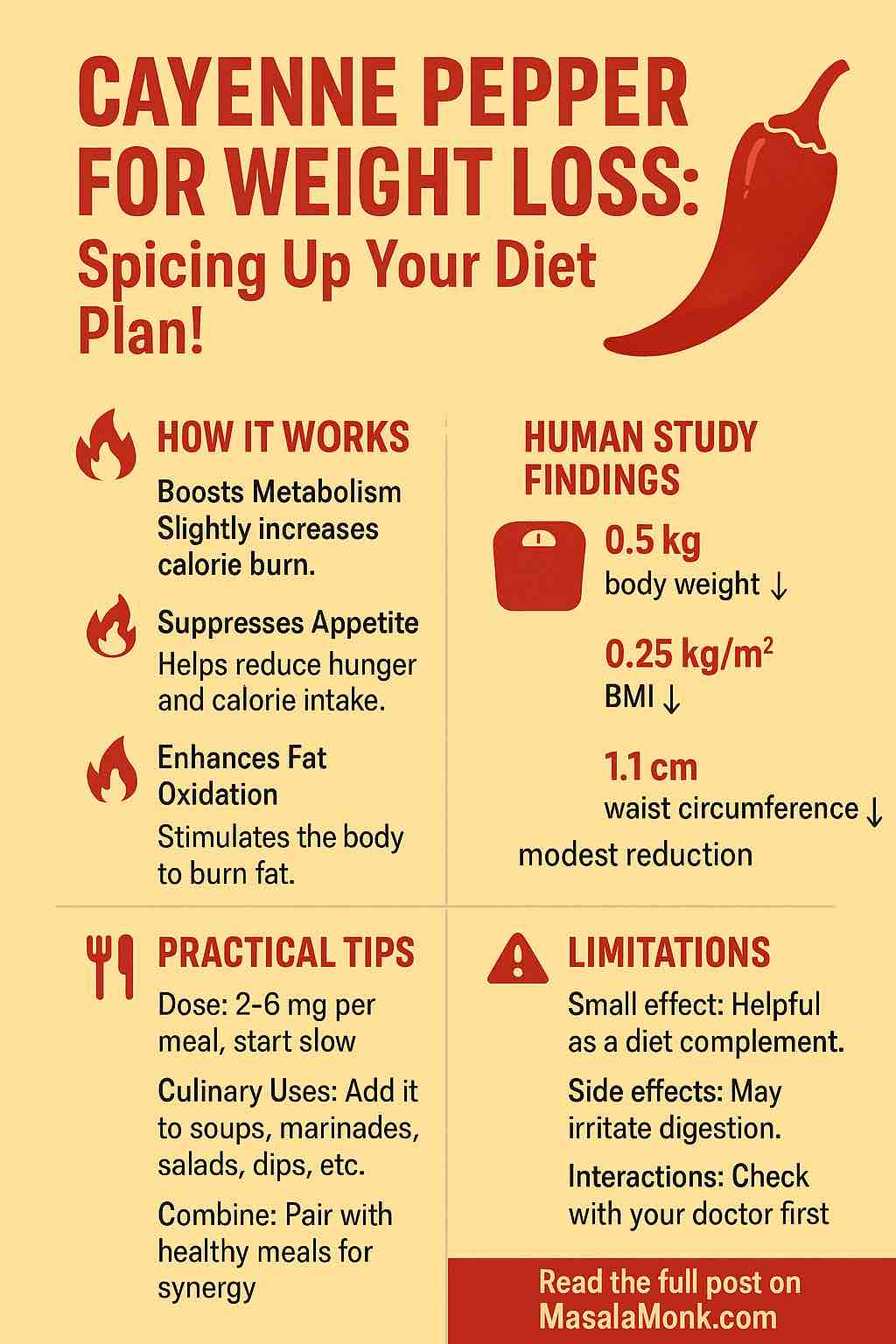
When it comes to weight loss, most people imagine bland salads, endless cardio, or strict calorie-counting. But what if your favorite spicy kick could actually help you slim down? Enter cayenne pepper — a fiery red spice made from ground chili peppers that not only adds flavor to your meals but might just tip the scales in your favor.
In this comprehensive guide, we explore how cayenne pepper works for weight loss, the science behind it, and practical tips to use it safely and effectively.
🔬 The Science Behind Cayenne Pepper and Weight Loss
Cayenne’s weight loss benefits stem primarily from capsaicin, the compound responsible for its heat. Here’s how it helps:
1. Thermogenesis: Fire Up Your Metabolism
Capsaicin stimulates thermogenesis — a process where your body generates heat, thereby burning more calories. Research shows that even small doses (2-6 mg per meal) can modestly increase energy expenditure by 50-70 calories per day. While this won’t melt fat overnight, it adds up over time.
2. Appetite Suppression
Cayenne pepper has been shown to decrease levels of the hunger hormone ghrelin and increase GLP-1, a hormone that promotes satiety. One study found people consumed up to 74 fewer calories at meals when adding capsaicin to their diet.
3. Fat Oxidation
Capsaicin activates TRPV1 receptors, encouraging your body to use fat as fuel. This could be especially helpful during workouts or intermittent fasting routines.
4. Mindful Eating Benefits
Adding heat to your meals can slow down how quickly you eat, helping your brain catch up with your stomach’s fullness signals. This behavioral benefit is often overlooked but can significantly reduce overeating.
📊 Evidence from Real-World Studies
Meta-analyses of randomized controlled trials (RCTs) have shown:
- Weight loss: ~0.5 kg reduction
- Waist circumference: ~1.1 cm decrease
- BMI drop: ~0.25 kg/m²
These results are modest but consistent. They show that capsaicin-rich diets can support your weight loss goals when paired with a healthy lifestyle.
🚩 Limitations and Caveats
Cayenne isn’t magic. Here’s what you need to keep in mind:
- Tolerance builds: The thermogenic effect decreases over time as your body adapts.
- Digestive irritation: Can cause heartburn, nausea, or stomach pain, especially at high doses.
- Medication interactions: May interfere with blood pressure meds, blood thinners, and diabetes drugs. Always consult your healthcare provider.
- Pregnancy/breastfeeding caution: Capsaicin may pass into breast milk and isn’t recommended for those pregnant or nursing without medical advice.
🌎 Practical Ways to Add Cayenne to Your Diet
You don’t need to eat a spoonful of spice to get the benefits. Here are simple, delicious ways to work cayenne into your meals:
☕ Morning
- Add a pinch to your lemon water or green tea
- Sprinkle on avocado toast or eggs
🍽️ Lunch
- Stir into soups, stews, or chili
- Mix into yogurt-based dressings or hummus
🍜 Dinner
- Season roasted vegetables or grilled meats
- Blend into marinades or sauces
🍇 Snacks
- Add a dash to popcorn or roasted nuts
- Mix into dark chocolate or spicy smoothies
Tip: Start small (1/8 tsp) and work your way up as your tolerance builds.
🔺 Supplementing with Capsaicin
If you’re not a fan of spice or have sensitive digestion, capsinoid supplements (non-pungent capsaicin analogs) offer a gentler alternative. Look for products standardized to at least 6 mg capsaicin per serving. As always, consult a healthcare professional before starting any supplement.
✅ Final Thoughts: Spicing Up Your Success
Cayenne pepper is a flavorful, research-backed addition to your weight loss toolkit. While it won’t replace healthy eating and exercise, it can enhance them in subtle but meaningful ways — boosting metabolism, curbing cravings, and helping you enjoy meals more mindfully.
So go ahead, spice things up. Your metabolism might just thank you for it.
Disclaimer: This article is for informational purposes only and does not constitute medical advice. Always consult your physician before starting any new dietary regimen or supplement.
🔍 FAQs on Cayenne Pepper for Weight Loss
1. How much cayenne pepper should I take daily for weight loss?
Start with 1/8 to 1/4 teaspoon per meal and gradually increase to 1/2 teaspoon if tolerated. Most studies show benefits from 2–6 mg of capsaicin per meal, which translates to around 1/2 teaspoon of cayenne powder daily.
2. Can cayenne pepper burn belly fat specifically?
While cayenne may aid in reducing overall body fat through increased metabolism and fat oxidation, it doesn’t target belly fat directly. However, some studies observed small decreases in waist circumference.
3. What time of day is best to take cayenne pepper?
There’s no strict timing, but using cayenne before or during meals can enhance satiety and thermogenesis. Many people add it to their morning drink or main meals for consistent intake.
4. Can I take cayenne pepper on an empty stomach?
It’s best to avoid it on an empty stomach if you’re prone to heartburn or digestive issues. Try adding it to meals to reduce irritation.
5. Are cayenne pepper supplements effective?
Yes. Capsaicin or capsinoid supplements can deliver benefits without the heat. Look for standardized extracts offering at least 6 mg capsaicin per dose. They’re especially useful if you dislike spicy foods.
6. How long does it take to see results with cayenne pepper?
Expect subtle changes over 4–12 weeks. Benefits like reduced appetite may be noticeable sooner, but weight and fat loss accumulate gradually with consistent use and a calorie-controlled diet.
7. Will I build a tolerance to cayenne’s effects?
Yes, thermogenic responses may decrease over time. Cycling off for a few days a week or using varied intake methods (e.g. food + supplements) may help retain sensitivity.
8. Can cayenne pepper interact with medications?
Yes. It can affect blood pressure meds, anticoagulants (e.g., warfarin), diabetes meds, and others. Consult your doctor before regular use if you’re on medication.
9. Is it safe to take cayenne pepper daily?
Generally safe in culinary amounts. For supplements or high doses, consult your healthcare provider, especially if you have GI issues, are pregnant, or nursing.
10. What are the side effects of taking too much cayenne?
Common side effects include stomach irritation, acid reflux, sweating, and, in rare cases, allergic reactions. Start with low doses and observe how your body reacts.











